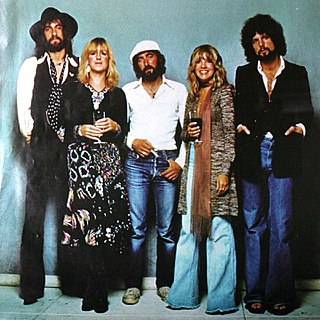
Fleetwood Mac are a British-American rock band formed in London in 1967 by guitarist and singer Peter Green. Green recruited drummer Mick Fleetwood, guitarist and singer Jeremy Spencer and bassist Bob Brunning, with John McVie replacing Brunning a few weeks after the band's first public appearance at the 1967 National Jazz & Blues Festival in Windsor. The band became a five-piece in 1968 with the addition of guitarist and singer Danny Kirwan.

Christine Anne McVie was an English musician and singer-songwriter. She was the keyboardist and one of the vocalists and songwriters of Fleetwood Mac.

Michael John Kells Fleetwood is a British musician, songwriter and actor. He is the drummer, co-founder, and leader of the rock band Fleetwood Mac. Fleetwood, whose surname was merged with that of the group's bassist John "Mac" McVie to form the name of the band, was inducted into the Rock and Roll Hall of Fame with Fleetwood Mac in 1998.
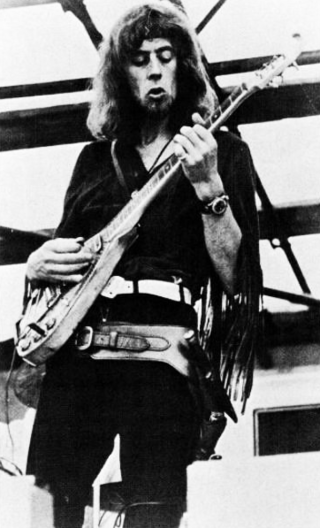
John Mayall & the Bluesbreakers were an English blues rock band led by multi-instrumentalist, singer and songwriter John Mayall. The band has been influential as an incubator for British rock and blues musicians. Many of the best known bands to come out of Britain in the 1960s and 1970s had members that came through the Bluesbreakers at one time, forming the foundation of British blues music that is still played heavily on classic rock radio. Among those with a tenure in the Bluesbreakers are guitarists Eric Clapton, Peter Green and Mick Taylor, bassists John McVie, Jack Bruce and Tony Reeves, drummers Hughie Flint, Aynsley Dunbar, Mick Fleetwood and Jon Hiseman, and numerous others.

David Walker is an English singer and guitarist who has been front-man for a number of bands; most notably The Idle Race, Savoy Brown and Humble Pie, he also served briefly with Fleetwood Mac and Black Sabbath.

John Brumwell Mayall was an English blues and rock musician, songwriter and producer. In the 1960s, he formed John Mayall & the Bluesbreakers, a band that has counted among its members some of the most famous blues and blues rock musicians. A singer, guitarist, harmonica player, and keyboardist, he had a career that spanned nearly seven decades, remaining an active musician until his death aged 90. Mayall has often been referred to as the "godfather of the British blues", and was inducted into the Rock and Roll Hall of Fame in the musical influence category in 2024.
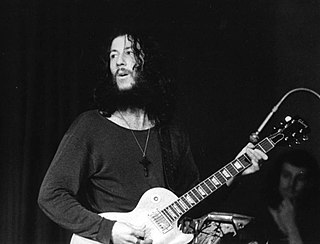
Peter Allen Greenbaum, known professionally as Peter Green, was an English blues rock singer-songwriter and guitarist. Green founded Fleetwood Mac in 1967 after a stint in John Mayall's Bluesbreakers and quickly established the new band as a popular live act in addition to a successful recording act, before departing in 1970. Green's songs, such as "Albatross", "Black Magic Woman", "Oh Well", "The Green Manalishi " and "Man of the World", appeared on singles charts, and several have been adapted by a variety of musicians.

Fleetwood Mac, also known as Peter Green's Fleetwood Mac, is the debut studio album by British blues rock band Fleetwood Mac, released in February 1968. The album is a mixture of blues covers and originals penned by guitarists Peter Green and Jeremy Spencer, who also share the vocal duties. It is the only album by the band without any involvement of keyboardist/vocalist Christine McVie.

Daniel David Kirwan was a British musician and guitarist, singer and songwriter with the blues-rock band Fleetwood Mac between 1968 and 1972. He released three albums as a solo artist from 1975 to 1979, recorded albums with Otis Spann, Chris Youlden, and Tramp, and worked with former Fleetwood Mac colleagues Jeremy Spencer and Christine McVie on some of their solo projects. He was inducted into the Rock and Roll Hall of Fame as a member of Fleetwood Mac in 1998.

Richard Francis Vito is an American guitarist and singer. He was part of Fleetwood Mac between 1987 and 1991. Vito took over as lead guitarist after Lindsey Buckingham left the group. He is best known for his blues and slide guitar style, whose influences include Elmore James, Robert Nighthawk, B.B. King, Alvino Rey, Les Paul, George Harrison, and Keith Richards.

Robert Joseph Weston was a British rock guitarist, who was a member of Fleetwood Mac in the early 1970s. He also recorded and performed with a number of other musicians, including Graham Bond, Long John Baldry, Murray Head, Sandy Denny, and Danny Kirwan.
Robert Brunning was a British musician who was, as a small part of a long musical career, the original bass guitar player with the blues rock band Fleetwood Mac.

Michael William Hugh Vernon is an English music executive studio owner, and record producer from Harrow, Middlesex. He produced albums for British blues artists and groups in the 1960s, working with the Bluesbreakers, David Bowie, Duster Bennett, Savoy Brown, Chicken Shack, Climax Blues Band, Eric Clapton, Fleetwood Mac, Peter Green, Danny Kirwan, John Mayall, Christine McVie and Ten Years After amongst others.
Blue Horizon Records was a British blues independent record label, founded by Mike Vernon and Neil Slaven in 1965, as an adjunct to their fanzine, R&B Monthly, and was the foremost label at the time of the British blues boom in the mid to late 1960s.
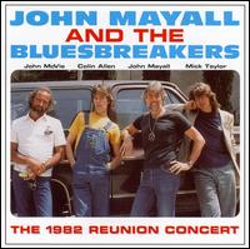
The 1982 Reunion Concert is a live album from a concert by British blues musician John Mayall. His sidemen are Mick Taylor on guitar, John McVie on bass and Colin Allen on drums. The concert took place at the Wax Museum, Washington DC, on 17 June 1982. It was released in 1994 by Repertoire Records as a CD credited to John Mayall and the Bluesbreakers.

The Best of Peter Green's Fleetwood Mac is a compilation album by British blues rock band Fleetwood Mac released in November 2002 and focusing on the Peter Green years. The album serves as a digitally remastered replacement for the band's Greatest Hits, with the remastering and cover art taken from the 1999 box set The Complete Blue Horizon Sessions 1967–1969.

Jeremy Cedric Spencer is a British musician, best known for playing slide guitar and piano in the original line-up of the rock band Fleetwood Mac. A member since Fleetwood Mac's inception in July 1967, he remained with the band until his abrupt departure in February 1971, when he joined the "Children of God", a new religious movement now known as "The Family International", with which he is still affiliated. After a pair of solo albums in the 1970s, he continued to tour as a musician, but did not release another album until 2006. He released further solo albums from 2012 onwards and has also recorded as part of the folk trio Steetley. As a member of Fleetwood Mac, he was inducted into the Rock and Roll Hall of Fame in 1998.
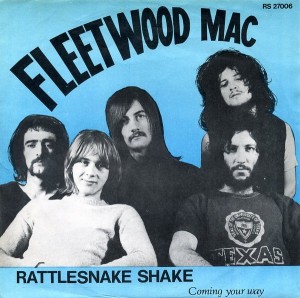
"Rattlesnake Shake" is a song by British rock group Fleetwood Mac, written by guitarist Peter Green, which first appeared on the band's 1969 album Then Play On. The track was one of the band's crowd-favorites in the late 1960s.


















